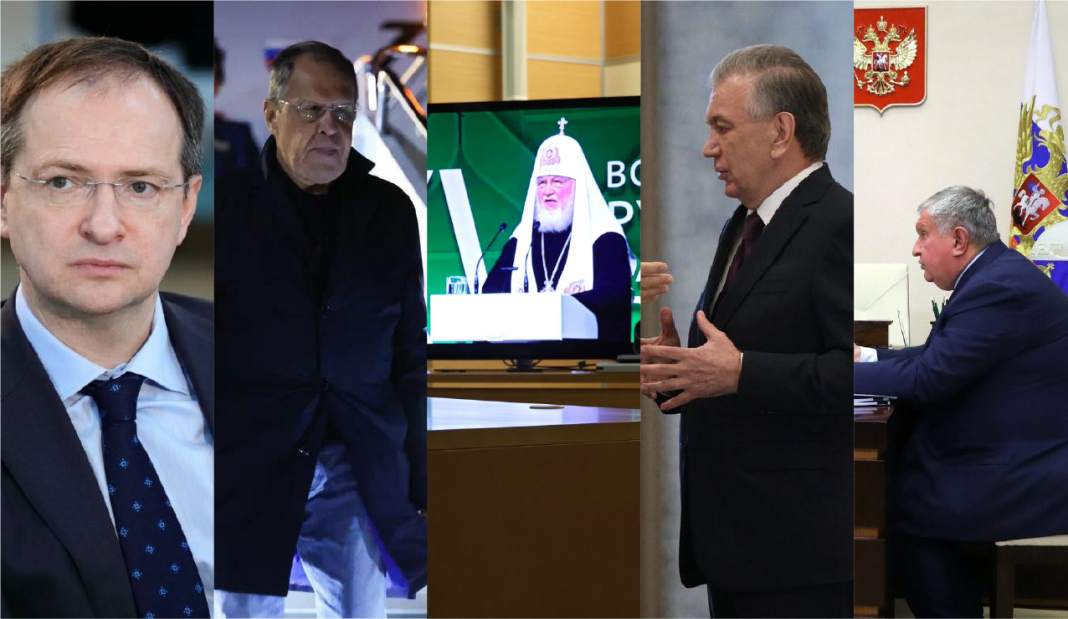This report describes the key events that significantly impacted Russia’s political, economic, and social processes.
Based on the results of the past week, the following trends can be summarised:
- On the eve of the presidential elections, it is important for Putin to enlist the support of the youth electorate, and this is only possible if he demonstrates his progressiveness. That is why Putin’s schedule included communication with progressive young scientists and a visit to a conference on artificial intelligence next week. Thus, Putin not only shows a desire to be at the forefront of scientific developments and to be as modern as possible but also to demonstrate that Russia has overcome the era of “brainwashing” – now Russia supposedly has its young scientific personnel, there is someone to advance science.
- The topic of the impact of technological sovereignty on security, raised by Putin at a regular meeting with the Security Council, is one of the most important for Russia today. The problem with technological sovereignty now is that it has never been so difficult to ensure the independence of one’s industry. All previous talks about import substitution and a sovereign industrial system turned out to be slogans. But Russia is faced with realities. At the same time, never before have the country’s military capabilities depended on the level of industrial development to the extent that they do now.
- This is the first time Russia has received such a budget: this is, in fact, a war budget, and a war not only with Ukraine (last year, the military sphere, despite significant visible challenges, had less of a burden). Obviously, Russia is preparing to show the West its readiness to challenge the remnants of the global security architecture and demonstrate its readiness to confront NATO not only on the Ukrainian field. Putin is trying to show that Russia will not give up, capitulate or compromise. Thus, the 2024 budget is another increase in the stakes in the big game.
This report highlights the following topics that were most relevant for Russia during 27th November – 3rd December:
1. Plenary session of the World Russian People’s Council
2. Telephone conversation with the President of Uzbekistan Shavkat Mirziyoyev
3. Putin’s meeting with young scientists
4. Meeting with permanent members of the Security Council of the Russian Federation
5. Putin’s meeting with representatives of big business in the Russian Federation
6. Putin signed the 2024-2026 budget
7. Participation of Sergei Lavrov in the OSCE summit
8. Statement by Vladimir Medinsky on negotiations with the Ukrainian delegation
9. Article by Vladislav Surkov
This Content Is Only For Subscribers
- Plenary session of the World Russian People’s Council
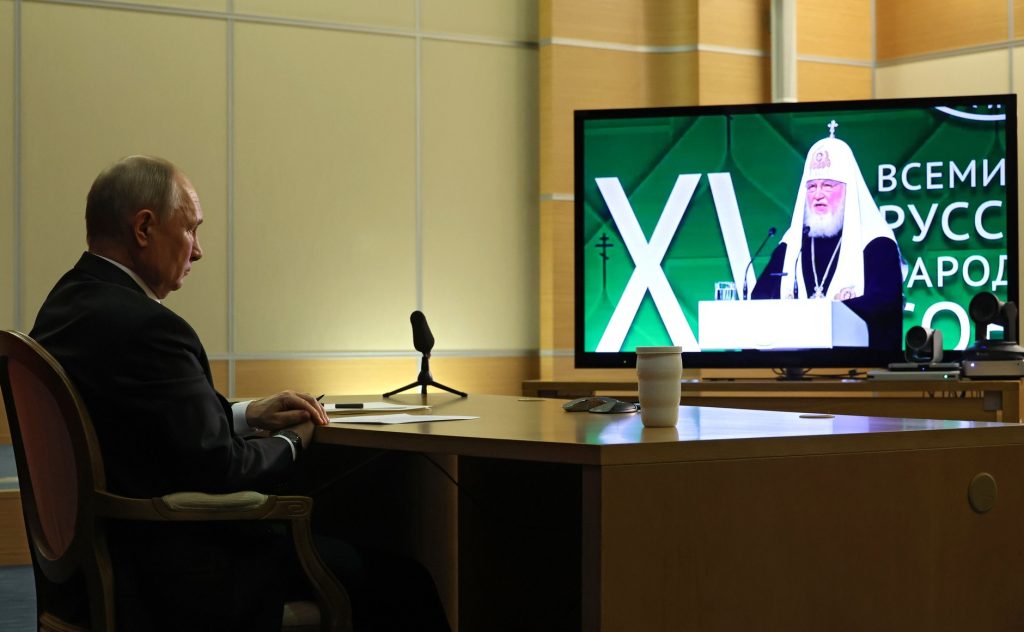
On Tuesday, November 28, a World Russian People’s Council session took place. The forum’s central theme dedicated to the 30th anniversary of the organisation’s creation was “The Present and Future of the Russian World.” Patriarch Kirill, representatives of the Russian Orthodox Church and other centralised religious organisations of Russia, government bodies, public associations, scientists and cultural figures participated in the session. Vladimir Putin also spoke at the session via video link.
Key theses:
- Putin: “Dear friends, our battle for sovereignty, for justice, without exaggeration, is of a national liberation nature because we defend the security and well-being of our people, the highest, historical right to be Russia – a strong, independent power, a country-civilisation. It is our country, the Russian world, as has happened more than once in history, that has blocked the path of those who claim world domination, their exclusivity.”
- Putin: “We are now fighting for the freedom of Russia and the whole world. We openly say that the dictatorship of one hegemon – we see it, everyone sees it now – is becoming decrepit. As they say, she has become a peddler and is simply dangerous to those around her. This is already clear to the entire world majority. But, I repeat, our country is now at the forefront of creating a more equitable world order. And I want to emphasise: without a sovereign, strong Russia, no lasting, stable world order is possible.”
- Putin: “We know what threat we are up against. Today, Russophobia and other forms of racism and neo-Nazism have become almost the official ideology of the Western ruling elites. They are directed not only against Russians but against all the peoples of Russia: Tatars, Chechens, Avars, Tuvinians, Bashkirs, Buryats, Yakuts, Ossetians, Jews, Ingush, Mari, and Altaians. There are many of us; I won’t name them all now, but, I repeat, this is directed against all the peoples of Russia.”
- Putin: “The West, in principle, does not need such a large and multinational country as Russia. Our diversity and unity of cultures, traditions, languages, and ethnic groups simply do not fit into the logic of Western racists and colonialists, into their cruel scheme of total depersonalisation, disunity, suppression and exploitation. Therefore, they again launched the old barrel organ: they say that Russia is a “prison of nations”, and the Russians themselves are a “people of slaves”. I have heard this many times over the centuries. We also heard that Russia, it turns out, needs to be “decolonised” today. But what do they need? Russia needs to be dismembered and plundered. If you can’t use force, then you can sow confusion.”
- Putin: “We have a large, diverse country. And this diversity of cultures, traditions, and customs is our strength, a huge competitive advantage and potential. We must constantly strengthen it, protect this diverse harmony, our common heritage.”
- Putin: “The Russian world is all our ancestors’ generations and descendants who will live after us. The Russian world is Ancient Rus’, the Muscovite Kingdom, the Russian Empire, and the Soviet Union; modern Russia is returning, strengthening and increasing its sovereignty as a world power. The Russian world unites everyone who feels a spiritual connection with our Motherland, who considers themselves a native speaker of the Russian language, history, and culture, regardless of even their national or religious affiliation.”
- Putin: “Russian is more than a nationality. This has always been the case, by the way, in the history of our country. This includes cultural, spiritual, and historical identity. Being Russian is, first of all, a responsibility. I repeat, there is a huge responsibility for preserving Russia; this is where true patriotism lies. As a Russian person, I want to say only a united, strong, sovereign Russia can guarantee the future and original development of the Russian people and all other peoples who have lived and are living in our country for centuries, united by a common historical destiny.”
- Putin: “We must solve colossal tasks in developing vast spaces from the Pacific Ocean to the Baltic and the Black Sea. Our economy, industry, agriculture, new industries, creative industries, and national business must increase their potential manifold.”
- Putin: “We are faced with many large-scale tasks; their solution requires truly conciliar work, and we are ready for it. We have become stronger. Our historical regions have returned to Russia. Society abandons everything superficial and turns to true, authentic values.”
- Patriarch Kirill: “A lot has happened in our country over the years. Russia has become a truly modern, scientifically and technologically developed, spiritually rich multinational state, where the interests of individual peoples and ethnic groups are so harmoniously combined with national interests.”
- Patriarch Kirill: “The use of the concept “Russian World” in Russian public discourse aroused many strong emotions both within the country, among supporters of the liberal model of development, and our, as is now commonly said, Western partners, who saw in this concept clear signs of the revival of the Russian self-awareness.”
- Patriarch Kirill: “So, about the very formula of the “Russian World.” And the formula is this: cultural diversity from the Roman to the Russian World.”
- Patriarch Kirill: “History remembers many similar examples. Thus, the famous Pax Romana became a symbol of the highest power of the Roman Empire, Pax Hispanica – the heyday of Spain, which extended its influence to South American lands, and Pax Britannica became a symbol of the period of world domination of the British order and colonialism. Today, they talk about Pax Americana, the established cultural and geopolitical union around the United States of America, which is the core of a particular economic, political and ideological system. Let’s not forget that there is also a substantial Arab world that unites countries of Arab culture. Moreover, even entire organisations are created based on sociocultural community. For example, the Arab League. Or the Union of South American Nations, uniting the countries of Latin America. The list of these cultural worlds can be continued for a long time. In the end, our Orthodox brothers, the Greeks, have been repeating for many centuries about the existence of the Greek world and chanting the great values of Hellenism. And this doesn’t bother anyone. But one has only to state the obvious – about the existence of an area of Russian culture, about the Russian world… How much noise arose when we formulated this idea and began to develop it? How many of the most ridiculous and far-fetched accusations were made by our imaginary friends and ill-wishers?
- Patriarch Kirill: “We already have all the most important things: the richest spiritual culture, the traditions of Orthodoxy, the unique valuable experience of living together peacefully and respectfully interacting with representatives of other nationalities and religions. We just need to be worthy heirs of our ancestors and live by our convictions so that deeds do not diverge from words.”
- Patriarch Kirill: “Today, Orthodox churches and monasteries are being actively built in Russia and in other countries under the canonical responsibility of the Russian Church. This fact is always impressive and causes undisguised surprise among many believers in the West, where Christian churches, on the contrary, are closed, converted at best into concert halls, and in some cases, into cafes and even nightclubs.”
- Patriarch Kirill: “I have said more than once before, and I will repeat: we live in a very favourable time; the Lord rarely gives such a unique chance. We can build constructive and friendly relations between the Orthodox Church and other religious associations and government authorities. This is perhaps the first time in the history of Russia. Even when the country called itself an Orthodox empire, there was no such mutual understanding and unanimity in resolving important issues related to strengthening the traditional spiritual and moral foundations of the life of the people.”
- Patriarch Kirill: “I am sure that in our days it is the preservation of the people, the revival of the traditional family that is the condition for the survival of the country and a goal for the achievement of which no resources should be spared: neither material, nor intellectual, nor organisational.”
- Patriarch Kirill: “Returning to the words I said 20 years ago, I would like to emphasise again: Russia can maintain different cultures in unity if and only if it recognises itself as Orthodox.”
Outcomes and outlook:
This event is significant for Putin, given the approaching presidential elections and the demand for a specific dominant ideology at the state level. Putin tried to formulate this ideology: it is based on the old canons of the “Russian world.” But now, in Putin’s understanding, the “Russian world” is not only the sphere of national interests of the Russian Federation, not only the area of dissemination of the Russian language and Russian culture, but also the area of settlement of Russian people.
Thus, he tried to bring together conservative and liberal doctrines, presenting them with the sauce of the “Russian world”. Experts note the eclecticism and confusion of Putin’s speech – it seems that he does not yet understand the contours of ideology (he has never been strong in ideological and humanitarian issues). In contrast to him, Patriarch Kirill, who has a long-standing mutual enmity with Putin, delivered a very structured and logical speech. By and large, the event, which was planned as a key event, went unimpressively and did not bring Putin any additional points.
- Telephone conversation with the President of Uzbekistan Shavkat Mirziyoyev
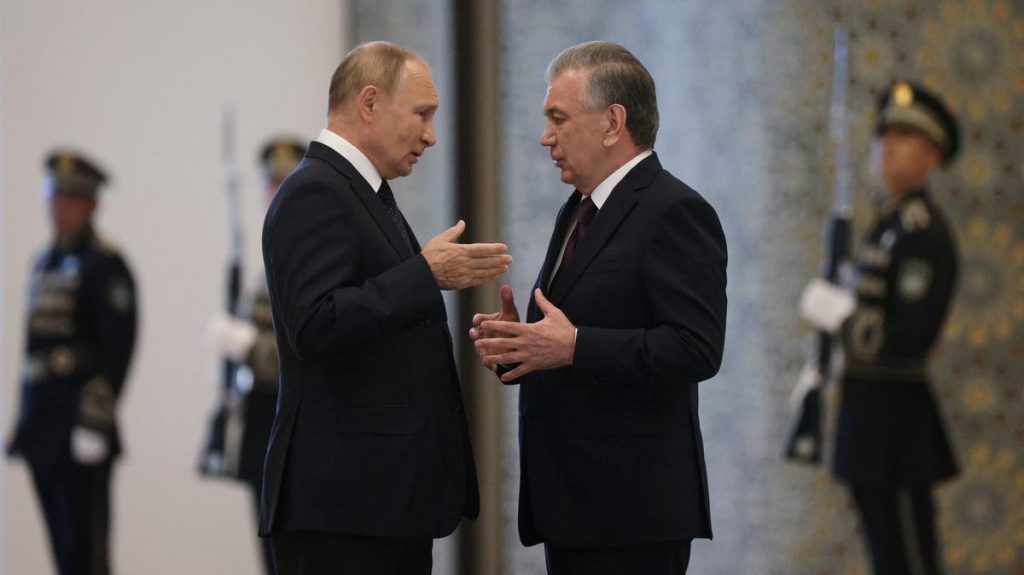
On Wednesday, November 29, Vladimir Putin spoke with the President of the Republic of Uzbekistan, Shavkat Mirziyoyev. According to official statements by both sides, during the conversation issues of bilateral cooperation were discussed, including the further implementation of plans and agreements reached during the recent visit of the President of Uzbekistan to Moscow.
Outcomes and outlook:
Putin is trying to consolidate friendly relations with Uzbekistan. In turn, President Shavkat Mirziyoyev is trying, while maintaining ties with Russia, to flirt with China and Europe (the recent visit of French President Macron is evidence of this) and even with the United States. Uzbekistan is an ambitious state, and Mirziyoyev is trying to play as independent a policy as possible. Still, he understands the need to maintain friendly relations with the Russian Federation in several areas.
- Putin’s meeting with young scientists
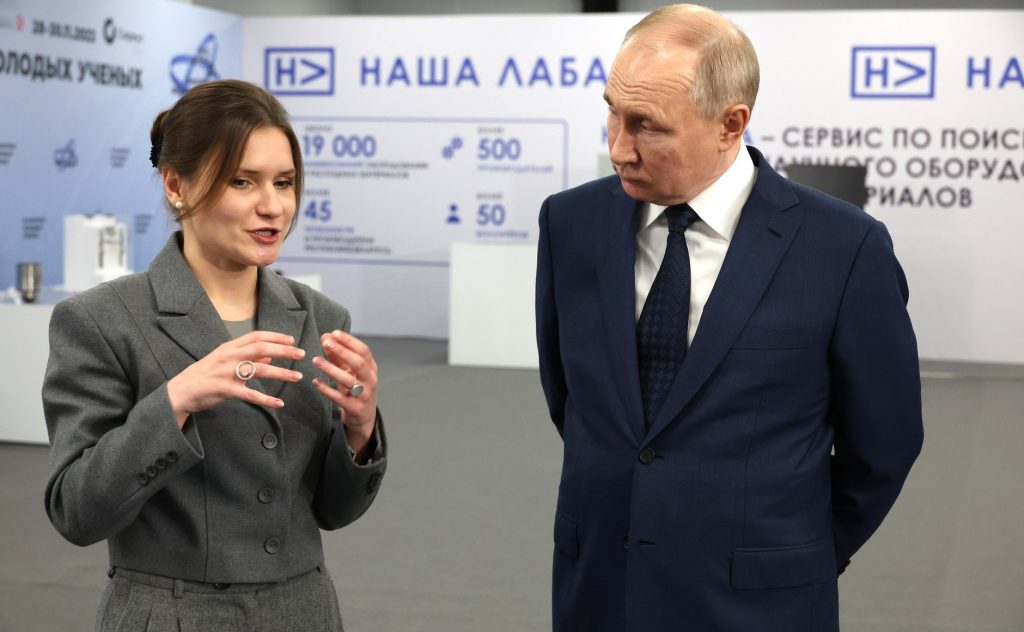
On Wednesday, November 29, Vladimir Putin took part in the III Congress of Young Scientists and held an open meeting with other event participants. During the meeting, young scientists presented Putin with new developments and technologies in various fields of science. Also, they discussed further opportunities for the development and implementation of specific technologies in multiple areas of activity. Also, before the meeting, the Russian President inspected the exhibits of the Our Lab project, within which about 110 pieces of scientific equipment from 17 leading Russian and Belarusian companies were presented. Later, Vladimir Putin also visited the Proryv-Sirius educational and experimental robotics center, created based on the Sirius University of Science and Technology. During the visit, Putin was shown a robotic fuel production line implemented at the training and experimental centre site, the main elements of which are universal and transport robots. All equipment is designed to support the concept of organising a production workflow without the participation of people, based on quickly replaceable modules that machines can service.
Outcomes and outlook:
Putin needs to gain the youth electorate’s support, which is only possible if he demonstrates his progressiveness. That is why Putin’s schedule included communication with progressive young scientists and, next week, a visit to a conference on artificial intelligence. Thus, Putin not only shows a desire to be at the forefront of scientific developments and to be as modern as possible but also to demonstrate that Russia has overcome the era of “brainwashing” – now Russia supposedly has its young scientific personnel, there is someone to advance science.
- Meeting with permanent members of the Security Council of the Russian Federation
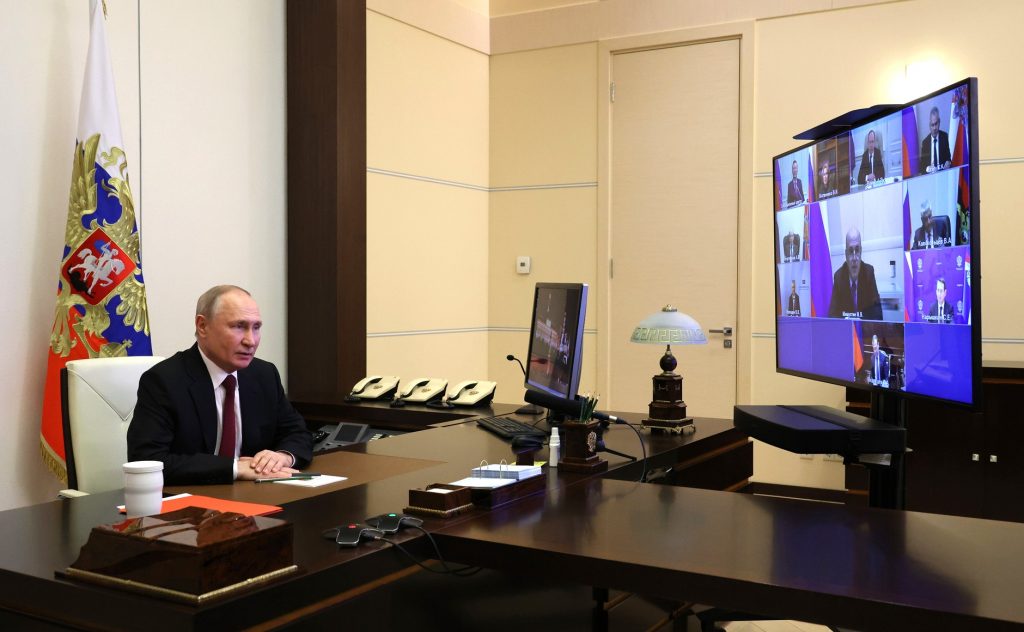
On Thursday, December 1, Vladimir Putin held a meeting with permanent members of the Russian Security Council. According to official reports, the main topic of the meeting was the impact of technological sovereignty on ensuring the country’s security. The main speaker on the meeting topic was First Deputy Prime Minister Andrei Belousov. Also taking part in the meeting were Prime Minister Mikhail Mishustin, Chairman of the Federation Council Valentina Matvienko, Chairman of the State Duma Vyacheslav Volodin, Deputy Chairman of the Security Council Dmitry Medvedev, Chief of the Presidential Administration Anton Vaino, Minister of Internal Affairs Vladimir Kolokoltsev, Minister of Defense Sergei Shoigu, Director of the Federal Security Service Alexander Bortnikov, Director of the Foreign Intelligence Service Sergei Naryshkin and Special Representative of the President on environmental issues, ecology and transport Sergei Ivanov.
Outcomes and outlook:
The impact of technological sovereignty on security, raised by Putin at a regular meeting with the Security Council, is one of the most important for Russia today. The problem with technological sovereignty now is that it has never been so difficult to ensure the independence of one’s industry. All previous talks about import substitution and a sovereign industrial system were slogans. But Russia is faced with realities. At the same time, never before have the country’s military capabilities depended on the level of industrial development to the extent that they do now. They tried to convince Putin that “Russia has more technological sovereignty than other recognised leaders of the “free world.” Putin complained that “for some reason, for some public, ‘technological sovereignty’ comes down to the question ‘can you make an iPhone’? And he answered: “We probably can’t have an iPhone, at least for now. However, the United States cannot do it alone now. But we don’t go around the world begging to buy ammunition.”
- Putin’s meeting with representatives of big business in the Russian Federation
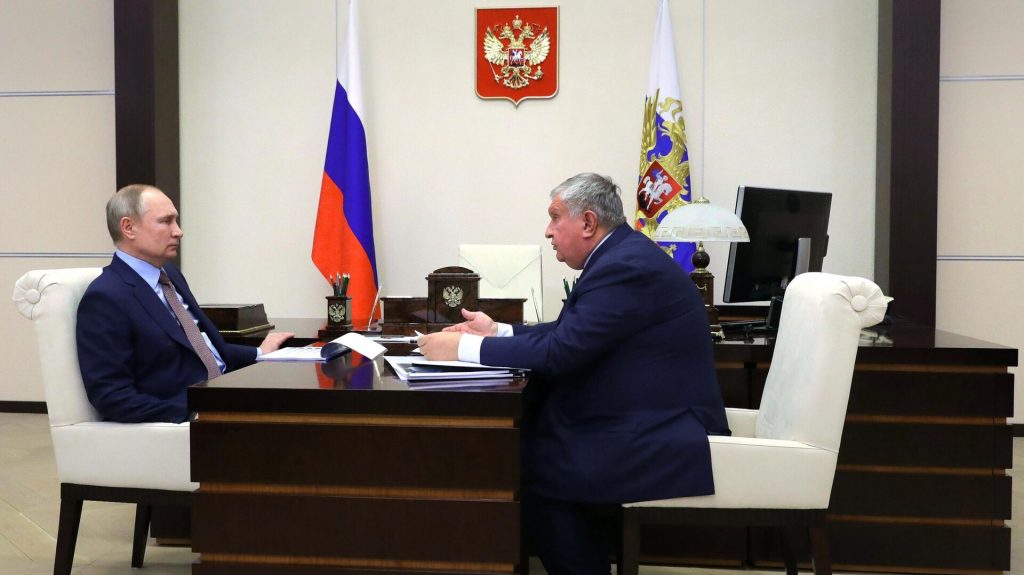
On Thursday, December 1, Vladimir Putin met with Rosneft Chief Executive Officer Igor Sechin in the Kremlin. Later, Putin’s press secretary, Dmitry Peskov, said that information about the meeting results would not be disclosed, and there were no plans to publish official reports. At the same time, Ascolta’s sources note that in addition to Sechin, Yuri Kovalchuk, Sergei Chemezov, and Roman Abramovich held (or are planning to hold shortly) meetings with the Russian president, which may indicate fundamental changes in the Kremlin’s strategy. At the same time, all meetings are held behind closed doors.
Outcomes and outlook:
During such meetings, the personal wishes of representatives of large businesses and state monopolies are considered, who are now limited in their ability to promote their interests in foreign markets and are trying to expand their presence in the domestic market. Obviously, during such meetings, we talk about areas of interest and influence, as well as minimising risks – especially against the backdrop of the adopted and signed budget of the Russian Federation. In addition, each of those with whom Putin met – Kovalchuk, Chemezov, Sechin, Abramovich – is making their contribution to the election campaign. And meeting with them is also an element of forming the election budget.
- Putin signed the 2024-2026 budget
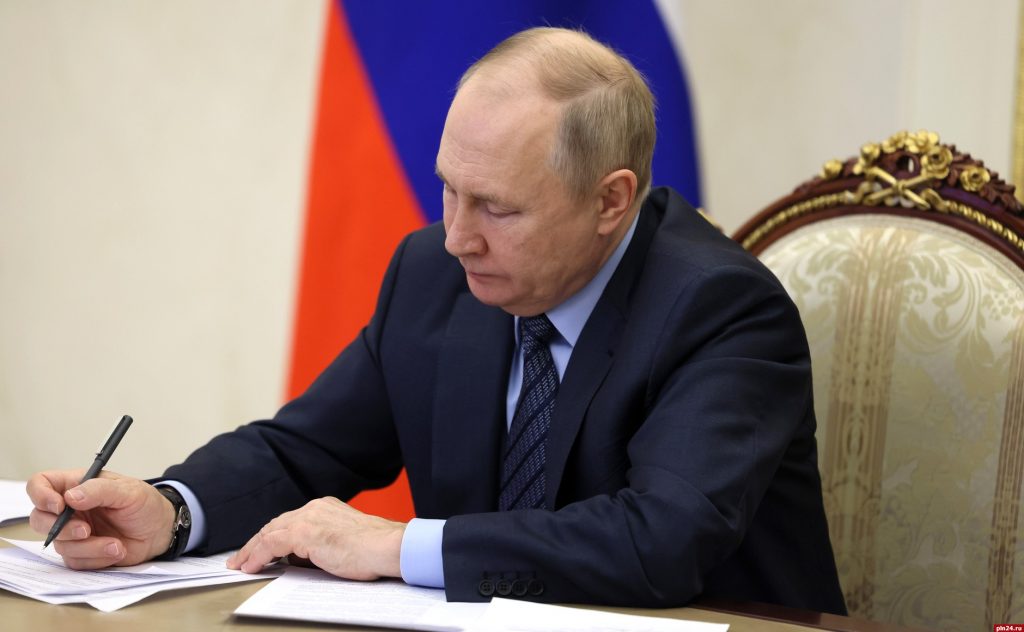
On Tuesday, November 27, Vladimir Putin signed the law on the federal budget for 2024 and the planning period 2025–2026. According to the signed law, federal budget revenues in 2024 are planned at 35 trillion rubles, and expenses at 36.6 trillion rubles. The deficit will be 1.59 trillion rubles or 0.9% of GDP. In 2025, revenues are expected to amount to 33.5 trillion rubles in 2026 – 34.1 trillion rubles, and expenses – 34.4 trillion and 35.6 trillion rubles, respectively. GDP in 2024 is projected to be 179.956 trillion rubles (an increase of 2.3%), in 2025 – 190.637 trillion rubles (an increase of 2.3%), and in 2026 – 202.304 trillion rubles (an increase of 2.2%).
At the same time, according to the adopted budget, next year, Russia will spend 10.7 trillion rubles (about 110 billion euros) on “national defence”. This is almost three times more than in 2021. Many analysts have already noted that the last time defence spending accounted for a third of the Kremlin’s budget was in 1990.
Outcomes and outlook:
This is the first time Russia has received such a budget: this is, in fact, a war budget, and a war not only with Ukraine (last year, the military sphere, despite large visible challenges, had less workload). Obviously, Russia is preparing to show the West its readiness to challenge the remnants of the global security architecture and demonstrate its readiness to confront NATO not only on the Ukrainian field. Putin is trying to show that Russia will not give up, capitulate or compromise. Thus, the 2024 budget is another increase in the stakes in the big game.
- Participation of Sergei Lavrov in the OSCE summit
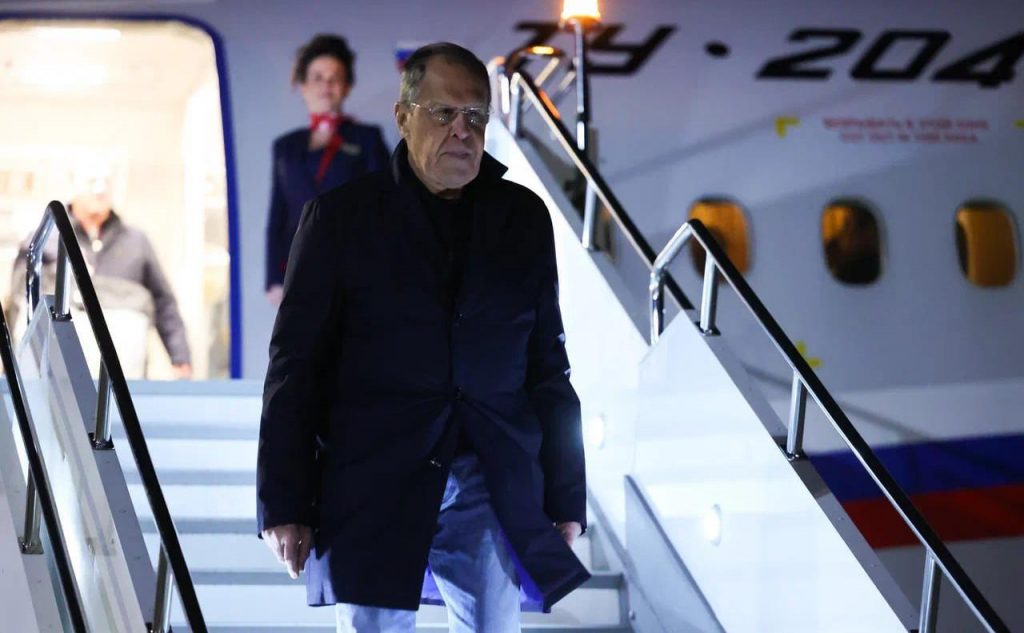
On Friday, December 2, the Council of OSCE Foreign Ministers took place in Skopje (North Macedonia). For the first time since the beginning of Russia’s full-scale invasion of Ukraine, Russian Foreign Minister Sergei Lavrov took part in the event (in 2022, the meeting took place in Lodz (Poland), and Lavrov was not invited). It is worth noting that during Lavrov’s speech at the Council of Ministers, delegations from some countries left the hall. Still, the head of the Russian Foreign Ministry continued to voice theses about the crisis of Western hegemony and the need to reset the system of international relations.
Lavrov’s key theses:
- “The Helsinki Final Act will be fifty years old in just over a year. In this regard, I regret to admit that the OSCE is approaching this anniversary in a deplorable state, and its prospects remain unclear.”
- “After the end of the Cold War and the associated ideological confrontation, a historic chance arose for the unifying potential of the OSCE to be used to the maximum and the organisation to become a platform for the broadest pan-European cooperation, a central element in the formation of an inclusive architecture of equal and indivisible security in all three dimensions.”
- “Unfortunately, Western political elites, who have arrogated to themselves the right to decide the destinies of humankind, have made a short-sighted choice not in favour of the OSCE, but in favour of NATO. In favour of the philosophy of containment, zero-sum geopolitical games and master-follower logic. One of the key components of this line was the bloc’s reckless expansion to the East, which began after the dissolution of the Warsaw Pact. Although, as it seemed, the end of the bipolar confrontation deprived the North Atlantic Alliance of its meaning of existence.”
- “In essence, Moldova is destined to become the next victim in the hybrid war unleashed by the West against Russia. Every country where Western emissaries, funds, etc., are now active. NGOs, it’s worth thinking about.”
- “To bring down the Russian economy, the United States and its European satellites have imposed thousands of sanctions against Russia, thereby putting an end to broad practical cooperation between East and West in our once common region. The Kyiv regime is Washington’s investment in its selfish interests of containing Russia and solving its own problems at the expense of others, including eliminating economic competitors, primarily in the person of the European Union.”
- “The neo-Nazi regime ruling in Kyiv has “outdone” even the Baltic countries in its actions to legally eradicate everything Russian. The very existence of Russians and their decisive contribution to the history of Ukraine is denied. People are prohibited from communicating, reading and studying in their native language and accessing Russian-language media and culture. There are plenty of facts, but the OSCE and its specialised institutions are silent.”
- “Under this silence and with the encouragement of the West, the Kyiv regime launched a disgusting campaign against the Ukrainian Orthodox Church, including the seizure of churches, persecution of believers and physical reprisals against clergy.”
- “The question arises: why do we need flawed human rights institutions that are turning into tools of those who have set a course for privatising the secretariats of international organisations to suit their needs? What interests of pan-European security and cooperation does such an OSCE serve?”
- “The current situation is a direct consequence of our Western neighbours’ persistent attempts to ensure their dominance, shamelessly using the OSCE to push through narrow self-interests aggressively and deliberately destroying the fundamental principle of consensus and the culture of diplomacy.”
- “Meanwhile, life does not stand still. The processes of Eurasian integration and equal cooperation based on an honest balance of interests are developing on our continent in constructive formats, regardless of the OSCE’s ever deeper immersion in the confrontational agenda imposed on it.”
- “I regret that we arrived at the 30th meeting of the OSCE Ministerial Council in a situation where we cannot celebrate this anniversary. We are observing a complete degradation of everything that was created in the Organization (before that, within the framework of the Conference) in all three dimensions of security (military-political, economic-environmental and humanitarian). I won’t give examples.”
Outcomes and outlook:
For Sergei Lavrov, the very appearance at the summit of OSCE foreign ministers was an event. His arrival showed that the West did not have a clear concept of relations with Russia. And the demarches of the Ukrainian, Polish and several other delegations during Lavrov’s speech were absolutely useless. The fact that Bulgaria gave the go-ahead for the flight with Lavrov on board and North Macedonia received the head of Russian diplomacy is indicative. The fact that the diplomats who left the meeting were in the minority is also an alarming signal. Several rounds of negotiations between the US and Russia, as well as between Russia and Germany, are due to take place shortly, and this also leads to speculation that the world is gradually trying to come to terms with the military challenge from Russia without being ready to continue the confrontation with Putin. One cannot but agree with the opinion of several Western analysts: unfortunately, Putin won this game against the West.
- Statement by Vladimir Medinsky on negotiations with the Ukrainian delegation
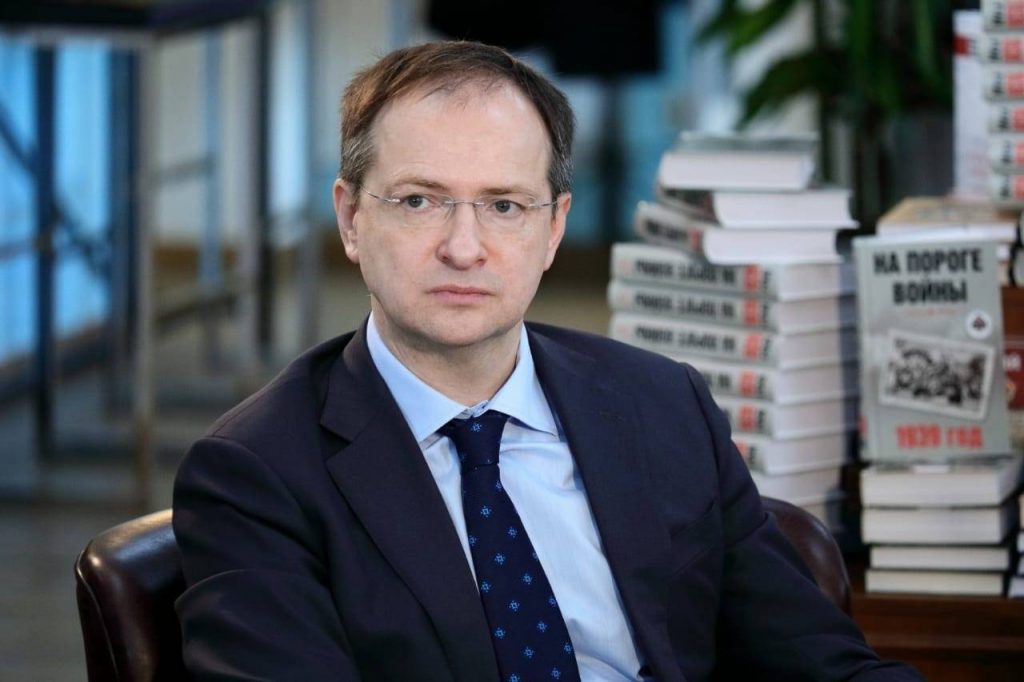
On Saturday, November 25, an interview was published with the head of the Servant of the People faction in the Verkhovna Rada of Ukraine, David Arakhamia, in which he, in particular, stated that in 2022, during the negotiation process between Ukraine and Russia, the Russian side was ready to agree for a ceasefire in exchange for Ukraine’s guarantee of non-entry into NATO. Arakhamia also said negotiations stopped after the visit of former British Prime Minister Boris Johnson to Kyiv, who suggested “just fighting.”
On Tuesday, November 28, commenting on the words of David Arakhamia, Assistant to the President of the Russian Federation Vladimir Medinsky (who was a member of the negotiating group from the Russian Federation in 2022), said that in addition to agreeing to a neutral status, Russia demanded that Ukraine recognise Crimea as Russian territory. At the same time, he noted that at that time, such negotiations were realistic:
“I am deeply convinced that if Kyiv had signed a peace treaty then on mutually acceptable terms, it would have thereby saved the lives of hundreds of thousands of its soldiers. But Zelensky chose war. These revelations of Arahamia, of course, do him credit. I will only add that after April 15, when the preliminary text of the peace treaty was ready, not only Boris Johnson came to Kyiv, but the main “hosts” also quickly flew in – as far as I remember, the head of the US State Department, the chief of the Pentagon.”
Medinsky also said that he currently sees no opportunity for resuming negotiations and considers such a chance lost:
“Peace between Russia and Ukraine will be possible if the tasks and goals of the [so-called] SMO are fully implemented.” “My deep conviction is that Ukraine and I have a common historical past; we are one people, and we have an inevitable common historical future.”
Outcomes and outlook:
Obviously, Medinsky’s words must be interpreted as another message to Ukraine and the West regarding Russia’s readiness to move on to negotiations, but on its terms (with the preservation of the occupied territories and while repeating two old theses – regarding demilitarization and denazification). Medinsky did not refute Arakhamia’s words, and thus, Arakhamia’s version regarding the negotiation process and the intervention of British Prime Minister Johnson in them became almost canonical, which created difficulties and inconveniences for Ukrainian President Vladimir Zelensky.
- Article by Vladislav Surkov
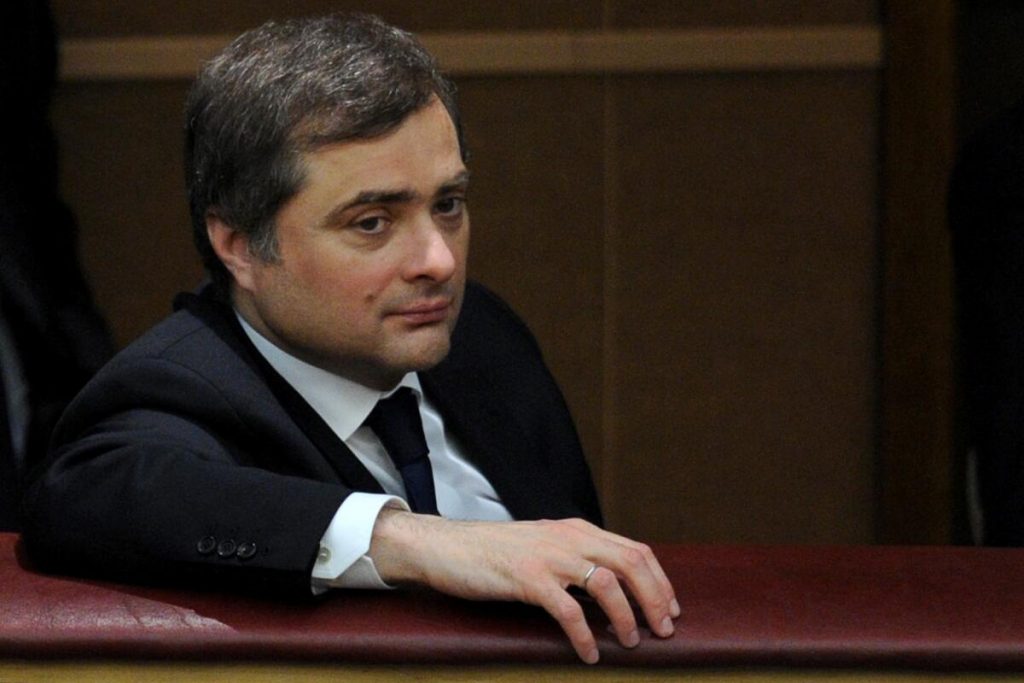
On Wednesday, November 29, former assistant to the President of the Russian Federation Vladislav Surkov published another article with discussions about Ukraine and Ukrainians. In the paper “Twilight on a Farm,” the author compares Ukrainians with the heroes of Nikolai Gogol’s work “Evenings on a Farm near Dikanka.” At the same time, the main essence of the text, as before, boils down to the fact that the author does not recognize the sovereignty of Ukraine and considers it “Little Russia”, incapable of making decisions on its own.
Key theses:
- “Fairy-tale worldview, magical thinking, impressionability and excessive poetry are the main features of the Ukrainian soul. Indeed, Dikanka and its surroundings are literally teeming with sorcerers, witches, revived drowned women and even devils. Belief in magic, the ease with which gentlemen and ladies succumb to the charm of evil spirits and then to saving disappointment in it, is the basis of all “evening” plots. A Ukrainian is always either bewitched or disenchanted; he does not know the third state.”
- “This is, naturally, the political culture of Ukraine. Occasionally, the sorcerers and witches of the Maidan convince people that life will get better if they mess around a little in the square. Tseevropa, NATO, visa-free, Ramstein, all these essentially meaningless words for farmers are, in fact, magical formulas, spells and conspiracies through which all problems should be solved overnight. They should, but they don’t dare. Then, sobering up and resentment for the failed miracle set in. The ratings of sorcerers and witches instantly collapse; they are cursed and forgotten. And, alas, they fall under the influence of fresh crooks.”
- “Ukrainians are beginning to become disillusioned with their sorcerers. And really, who will help them? Biden mummified alive? Decadent Zaluzhny? Unhappy childless couple Ermak/Zelensky? Hardly. Twilight. Eve of darkness. There will be no miracle.”
- “Many on Bankova secretly dream of Minsk-3. In vain. And there will be no Minsk-3. Russia is no longer a mediator, patiently sorting out neighbourly squabbles. Russia is now an impatient participant in the great struggle, which will take its toll. Understand, pagans. Next year will be a year of degradation and disorganization of the Ukrainian fake “state.” And the fooled Ukrainians will say about Zelensky: “I mistook an icicle and a rag for an important person!”
Outcomes and outlook:
Today, Surkov is deprived of decision-making leverages in the Kremlin and the Old Square. He only reminds himself occasionally in the form of vivid texts with no political or applied value. That is why Surkov’s essays and articles should be perceived as political fiction of a once influential person, as his own perception (and the perception of a small political environment that focuses not so much on Surkov but on jingoistic slogans and militaristic rhetoric). Otherwise, one can only express satisfaction that Surkov today is not in the process of influencing decision-making in the Presidential Administration and in Putin’s entourage.

